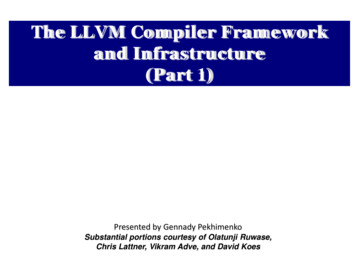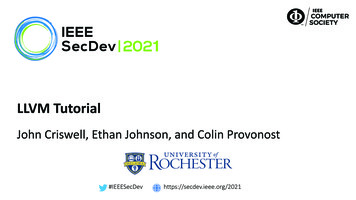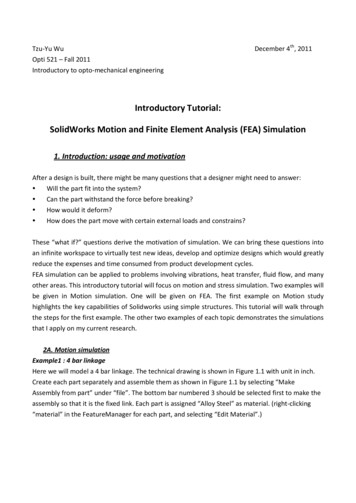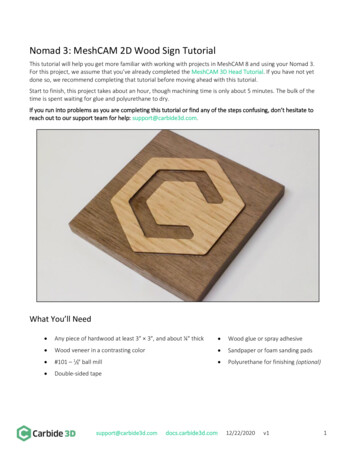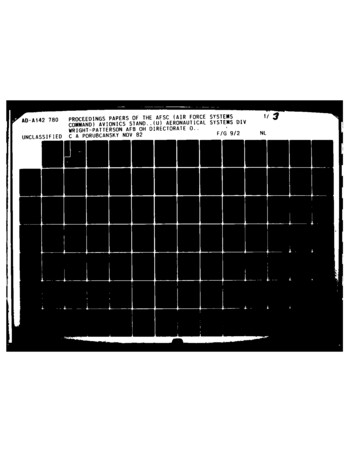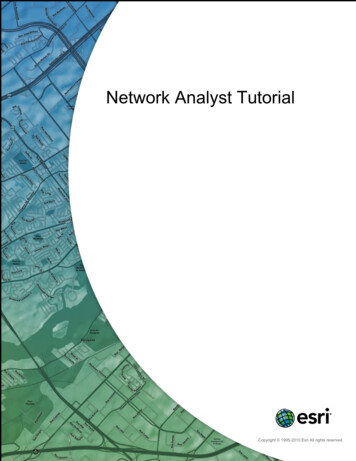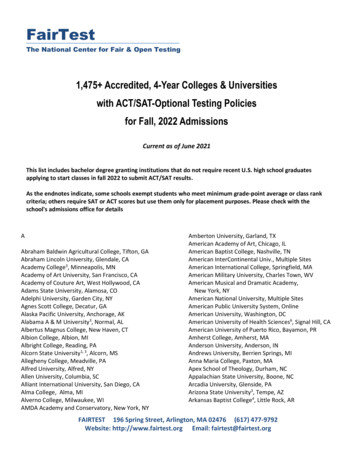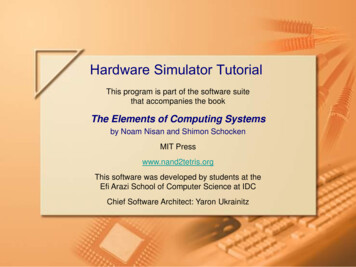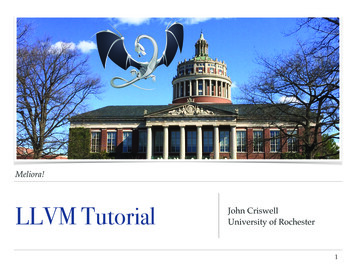
Transcription
Meliora!LLVM TutorialJohn CriswellUniversity of Rochester!1
Introduction!2
History of LLVM Developed by Chris Lattner and Vikram Adve at theUniversity of Illinois at Urbana-Champaign (UIUC) Released open-source in October 2003 Default compiler for Mac OS X, iOS, and FreeBSD Used by many companies and research groups Contributions by many people!!3
LLVM is a compiler infrastructure!!4
Tools Built Using LLVM!5
Tools Built Using LLVM!srelipmCo!5
Tools Built Using LLVM!srelipmCoJITs!!5
Tools Built Using LLVM!srelipmCoJITs!!noitacfiireVlamFor!5
Tools Built Using LLVM!srelipmCoSecurity HardeninJITs!g Tools!!noitacfiireVlamFor!5
Tools Built Using LLVM!srelipmCoJITs!Security Hardening Tools!!noitacfiireVlamFor!lsooTgindinFguB!5
Tools Built Using LLVM!srelipmCoJITs!Security Hardening Too!lsooTgindinFguBls!!noitacfiireVlamForProfiling Tools!!5
Things to Do in the Compiler Zoo Add a security check to every load and store Create a memory access trace Check pointer arithmetic on certain types of variables Trace atomic modifications to a memory location Change order of local variables in stack frame!6
What do you want to do withLLVM?!7
LLVM Source Code Structure LLVM is primarily a set of libraries We use the libraries to create LLVM-based tools!8
Programming Background C Other language bindings exist, but C is “native” Know how to use classes, pointers, and references Know how to use C iterators Know how to use Standard Template Library (STL)!9
Helpful Documents LLVM Language ReferenceManual LLVM Programmer’s Manual How to Write an LLVM Pass Online LLVM Doxygendocuments!10
Getting Involved with LLVM Research on program analysis (NSF REUs) Google Summer of Code projects Apple, Samsung, Google, Facebook build LLVM tools LLVM Developer’s Meeting One in California; one in Europe Can present talks, posters, BoFs, etc.!11
Please fill out feedback form:https://forms.gle/ib3Ng6osSFqNoQGD7!12
LLVM Compiler Structure!13
Ahead of Time (AOT) CompilerFront EndOptimizerCode Generator!14
Front End !15
Optimizer StructureLLVMIROpt 1LLVMIRCodeGenMachineIROpt 2LLVMIR!16
Code Generator mitterNativeCodeInstructionSchedulingMachineIR!17
LLVM Toolchain OverviewIntermediate RepresentationDescriptionClang ASTDescribes structure of source code(if-statements, while-loops)LLVM IRArchitecture independent code in SSA formMachine IRNative code(machine registers; native code instructions)!18
LLVM Toolchain OverviewIntermediate RepresentationDescriptionClang ASTDescribes structure of source code(if-statements, while-loops)LLVM IRArchitecture independent code in SSA formMachine IRNative code(machine registers; native code instructions)!18
LLVMIntermediate Representation!19
LLVM IR is a language into which programsare translated for analysis and transformation(optimization)!20
LLVM IR Forms LLVM Assembly Language LLVM Bitcode Text form saved on disk for humans to readBinary form saved on disk for programs to readLLVM In-Memory IR Data structures used for analysis and optimization!21
LLVM Assembly Languagedefine i32 @foo(i32, i32) local unnamed addr #0 {%3 tail call i32 @bar(i32 %0) #2%4 add nsw i32 %1, %0%5 sub i32 %4, %3ret i32 %5}declare i32 @bar(i32) local unnamed addr #1!22
Overview of LLVM IR Each assembly/bitcode file is a Module Each Module is comprised of Global variables A set of Functions which are comprised of A set of basic blocks which are comprised of A set of instructions!23
LLVM Bitcode FileModuleGlobal int[20];Function: foo()Function: !24
LLVM Module with One Functiondefine i32 @foo(i32, i32) local unnamed addr #0 {%3 icmp ult i32 %0, %1br i1 %3, label %4, label %6%5 tail call i32 @bar(i8* getelementptr inbounds ([7 x i8], [7 x i8]* @.str, i64 0, i64 0)) #2br label %8%7 tail call i32 @bar(i8* getelementptr inbounds ([5 x i8], [5 x i8]* @.str.1, i64 0, i64 0)) #2br label %8%9 add i32 %1, %0ret i32 %9}!25
LLVM Instruction Set RISC-like architecture Virtual registers in SSA form Load/store instructions to read/write memoryobjects All other instructions read or write virtual registers!26
LLVM Memory Objects Global Variables Memory allocated on the stack Memory allocated on the heap!27
Instructions for Computation Arithmetic and binary operators Two’s complement arithmetic (add, sub, multiply, etc) Bit-shifting and bit-masking Pointer arithmetic (getelementptr or “GEP”) Comparison instructions (icmp, fcmp) Generates a boolean result!28
Memory Access Instructions Load instruction reads memory Store instruction writes to memory Atomic compare and exchange Atomic read/modify/write!29
Control Flow Instructions Terminator instructions Indicate which basic block to jump to next conditional branch, unconditional branch, switch Return instruction to return to caller Unwind instruction for exception handlingCall instruction calls a function It can occur in the middle of a basic block!30
Memory Allocation Instructions Stack allocation (alloca) Calls to heap-allocation functions (e.g., malloc()) Allocates memory on the stackNot a special instruction; just uses a call instructionGlobal variable declarations Not really instructions, but allocate memory All globals are pointers to memory objects!31
Single Static Assignment (SSA) Each function has infinite set of virtual registers Only one instruction assigns a value to a virtual register(called the definition of the register) An instruction and the register it defines aresynonymous%z add %x, %y32
The Almighty Phi Node!y 5;x y 1;x y 2;z z x 3;x;!33
The Almighty Phi Node!y 5;x y 1;y 5;x y 2;z z x 3;x;x1 y 1;x2 y 2;x3 phi(x1,x2);z x3 3;!33
Domination AThe definition of a virtualregister must dominate all ofits usesExcept uses by phi-nodesA dominates B, C, and DBCD!34
Writing an LLVM Pass!35
LLVM Passes: Separation of Concerns Break optimizer into passes Each pass performs one analysis or one transformation!36
LLVM PassesOptimizerLLVMIRPass1LLVMIRPass2LLVMIR!37
Two Types of Passes Passes that analyze code Does not modify the program Provides information “out of band” to other passesPasses that transform code Make modifications to the code!38
LLVM PassesDominator Tree DataLLVMIRDomTreeLLVMIRDGELLVMIRMem2RegLLVMIR!39
LLVM IR Pass Types ModulePass FunctionPass BasicBlockPass I recommend ignoring “funny” passes LoopPass RegionPass!40
Rules for LLVM Passes Only modify values and instructions at scope of pass ModulePass can modify anything FunctionPass should not modify anything outside ofthe function BasicBlockPass should not modify anything outsideof the basic block!41
Important Pass Methods: getAnalysisUsage() Tells PassManager which analysis passes you need PassManager will schedule analysis passes for you Cannot schedule transform passes this wayTells PassManager which analysis results are valid aftera transformation Avoids re-running expensive analysis passes!42
runOnModule() Entry point for ModulePass Passes a reference to the Module Can locate functions, basic blocks, globals from Module Return true if the pass modifies the program An analysis pass always returns false. A transform pass can return either true or false.!43
runOnFunction() Called for each function in the Module Passed reference to Function Return false for no modifications; true for modifications!44
runOnBasicBlock() You get the idea !45
MyPass.h Exampleclass MyPass : public ModulePass {private:unsigned int analyzeThis (Instruction *I);public:static char ID;MyPass() : ModulePass(ID) {}const char *getPassName() const { return “My LLVM Pass"; }virtual bool runOnModule (Module & M);virtual void getAnalysisUsage(AnalysisUsage &AU) const {// We require Dominator informationAU.addRequired DominatorTree ();}unsigned int getAnalysisResultFor (Instruction *I);};!46
MyPass.cpp Examplestatic RegisterPass MyPass P (“mypass”, “My First LLVM Analysis”);boolMyPass::runOnModule (Module & M) {//// Iterate over all instructions within a Module//for (Module::iterator fi M.begin(); fi ! M.end(); fi) {for (Function::iterator bi fi- begin(); bi ! fi- end(); bi) {for (BasicBlock::iterator it bi- begin(); it ! bi- end; it) {Instruction * I *it;}}}}!47
In-Memory LLVM IR!48
LLVM Classes There is a class for each type of IR object Module class Function class BasicBlock class Instruction classClasses provide iterators for objects within them!49
LLVM In-Memory IRModuleGlobal int[20];Global nBasicBlockaddmultbraddretBasicBlock!50
Class Iterators Each class provides iterators for items it contains Module::iterator iterates over functions Function::iterator iterates over basic blocks BasicBlock::iterator iterates over instructions!51
Iterator Example//// Iterate over all instructions within a BasicBlock//BasicBlock * BB ;BasicBlock::iterator it;BasicBlock::iterator ie;for (it BB- begin(), end BB- end(); it ! end; it) {Instruction * I *it;};!52
MyPass.cpp Example (Reprise)static RegisterPass MyPass P (“mypass”, “My First LLVM Analysis”);boolMyPass::runOnModule (Module & M) {//// Iterate over all instructions within a Module//for (Module::iterator fi M.begin(); fi ! M.end(); fi) {for (Function::iterator bi fi- begin(); bi ! fi- end(); bi) {for (BasicBlock::iterator it bi- begin(); it ! bi- end; it) {Instruction * I *it;}}}}!53
LLVM Class Hierarchy Anything that is an SSA value is a subclass of Value All Instruction classes are a subclass of Instruction Similar instructions share a common superclass!54
Simplified LLVM Class witchInstRetInst!55
Locating Branch Instructions//// Iterate over all instructions within a BasicBlock//BasicBlock::iterator it;BasicBlock::iterator ie;for (it BB- begin(), end BB- end(); it ! end; it) {Instruction * I *it;if (BranchInst * BI dyn cast BranchInst (I)) {// Do something with branch instruction BI}}!56
Casting to Subclass in LLVMCasting FunctionDescriptionExampleisa Class ()Return true or false if value is ofthat class.isa BranchInst (V)Returns pointer to object of typedyn cast Class ()dyn cast BranchInst (V)Class or NULL!57
Locating Branch Instructions//// Iterate over all instructions within a BasicBlock//BasicBlock::iterator it;BasicBlock::iterator ie;for (it BB- begin(), end BB- end(); it ! end; it) {Instruction * I *it;if (BranchInst * BI dyn cast BranchInst (I)) {}}// Do something with branch instruction BI!58
LLVM Instruction Classes BinaryOperator - add, sub, mult, shift, and, or, etc. GetElementPointerInst LoadInst, Storeinst BranchInst, SwitchInst, RetInst CallInst CastInst!59
LLVM Class Methods Each class has methods to get information on value BranchInst - Iterator over successor basic blocks StoreInst - Get pointer operands of store instruction GetElementPtrInst - Get indices used as operands Instruction - Get containing basic blockMethod might belong to a superclass!60
Beyond the Tutorial!61
Data Flow Analysis The Dragon Book, Fourth Edition Papers on SSA-based algorithms Kam-Ullman paper on iterative data-flow analysis!62
Getting Involved with LLVM Research on program analysis (NSF REUs) Google Summer of Code projects Apple, Samsung, Google, Facebook build LLVM tools LLVM Developer’s Meeting One in California; one in Europe Can present talks, posters, BoFs, etc.!63
LLVM Tutorial John Criswell University of Rochester!1. Introduction!2. History of LLVM . Know how to use Standard Template Library (STL)!9. Helpful Documents . A dominates B, C, and D A B D C!34. Writing an LLVM Pass!35. LLVM Passes: Separation of Concerns
